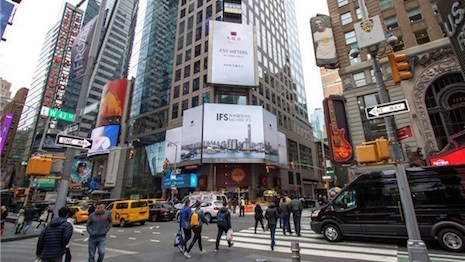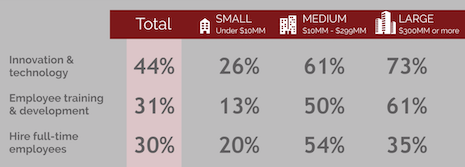 Most business leaders believe their companies are meeting financial expectations. Image credit: The Wharf Limited
Most business leaders believe their companies are meeting financial expectations. Image credit: The Wharf Limited
Affluent global business leaders are largely optimistic, with 76 percent of owners and executives at large firms saying they are confident about their companies’ futures.
Eighty-three percent of leaders at large companies reported to YouGov that their businesses are healthy, outpacing the outlook of small and medium business executives. YouGov categorizes large businesses as those with annual revenue of $300 million and above.
“Nearly nine of 10 report that their businesses are performing at or above expectations,” said Cara David, managing partner at YouGov, New York. “Thirty-eight percent of large business leaders are feeling this way.
“Many of these business leaders are wisely leveraging this opportunity to spur their business even further,” she said. “Business leaders in large companies push forward with innovation, technology and employee development.”
YouGov's study is based on a survey of owners and C-level executives at businesses across industry sectors.
Business confidence
The majority, 53 percent, of YouGov's respondents are responsible for managing “small” businesses with less than $10 million of annual revenue. Businesses with annual revenue between $10 and $299 million are deemed medium enterprises.
Sixty-five percent of business leaders at small and midsize businesses report that their companies are healthy, compared to 83 percent of executives at large companies.
Executives at large companies feel especially confident about their businesses. Image credit: Omega
Across businesses of all sizes, the majority of executives believe their companies are performing at or above expectations.
Business leaders are taking these financial gains and reinvesting in their firms, particularly in terms of technology and personnel development.
Nearly three-quarters, 73 percent, of large enterprises are investing in innovation and technology, compared to 44 percent of overall companies.
Technology investments can be valuable to businesses in the long run.
According to a report from Retail Systems Research, the most successful companies at integrating technology are motivated by having more accurate inventory information to serve their multichannel sales, while the companies that saw weaker sales were driven by the opportunity to reduce costs and make internal operations more efficient (see story).
Companies are investing their financial gains back into their businesses. Image credit: YouGov
Business leaders are also lukewarm at best towards the business policies of President Donald Trump's administration. Only 35 percent of respondents believe the president's initiatives have been good for business.
Nonetheless, executives remain optimistic, with 65 percent feeling confident about their businesses, including 76 percent of leaders at large firms.
Additional insights
Despite apprehension around global economies heading into 2019, the population of the ultra-wealthy continues to grow.
The looming trade war between the United States and China and crackdowns on the daigou market are weighing on luxury stocks, as the business’ biggest public companies saw their share price slide last month.
In November, the Savigny Luxury Index that tracks the stock trajectory of 18 firms fell 11.3 percent, putting the average share price below where it started in January. With uncertainty surrounding China, the luxury business is in turn facing a slowdown in both sales growth and stock performance (see story).
According to a report from Wealth-X, however, the global ultra-high-net-worth population grew significantly in 2017, with an increase of nearly 13 percent compared to 3.5 percent growth in 2016.
Individuals with a net worth of $30 million or more now number 255,810, a jump of 12.9 percent over 2016. Despite global uncertainty, the climate is still favorable for wealth as the combined net worth of the UHNW population is $31.5 trillion, an increase of 16.3 percent (see story).

